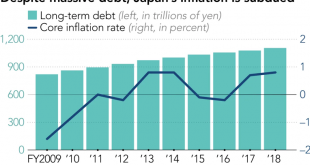By L. Randall Wray PART 1 As many readers know, the third annual MMT conference was recently held at Stonybrook, and you can find the program as well as videos of the conference at the link: (https://www.mmtconference.org/). In addition, real-world economics review has just issued a new volume devoted to MMT (http://www.paecon.net/PAEReview/issue89/whole89.pdf). I’ll briefly address both, in two parts. I’ll talk about the conference in this one, and about the RWER papers in the second...
Read More »Two-Cent Message
By J.D. ALT Elizabeth Warren has succeeded, I think, in framing an argument as close as anyone is going to get (in the present election cycle) to the progressive position of MMT. Warren acknowledges that she’s proposing goals and undertakings that will “cost” a lot of money. She further acknowledges that everyone asks: “How are you going to pay for it?” And she gives a very specific and simple answer: an “ultra-millionaire tax”—which she details as “two-cents on every dollar of income...
Read More »Awakening the Investor-in-Whole-Society
By J.D. ALT There’s a lot of handwringing now about how central banks have no ammunition to fight a recession. The fact that this is apparently true—and, perhaps, uniquely true in modern history—is all the more reason to explore MMT’s premise that central banks are not just instruments of private commerce, but are, as well, instruments of collective, democratic will. The bankers are in a box of their own making, but that box, in fact, is inside another box which, as MMT makes clear, has...
Read More »Why Moscow Mitch needs MMT
By J.D. ALT Mitch McConnell is desperate to find investment funds and businesses that will create jobs for his Kentucky constituents. America, it seems, is mostly incapable of being a source for either. Such is the diminishment of our impoverished private enterprise system that only foreign companies seem interested in bringing U.S. dollars to America to build the factories that will employ us. America, for example, has not built an aluminum rolling mill in over forty years. It must be...
Read More »A Modern Money Explanation
By J.D. ALT Since the Democrat’s presidential debates, the attacks on progressive candidates for their “unrealistic” proposals to address the biggest challenges we face as a collective society have intensified dramatically. The primary criticism is the enormous price-tag associated with each of the big-ticket issues they propose to undertake: universal healthcare, mitigating climate-change, eliminating college debt, free pre-school daycare, re-envisioning and rebuilding America’s...
Read More »Bloomberg Interview: Wray on Modern Monetary Theory
Michael Stephens | July 31, 2019 Bloomberg Businessweek‘s Cristina Lindblad and Peter Coy sat down with L. Randall Wray for an in-depth interview on Modern Monetary Theory: $title = the_title('','',false); ?> if ($title == 'Contributors') { //get_levy_contributors(); } ?> Comments
Read More »MMT Carbon Initiative—a modest proposal
By J.D. ALT With great interest, I’ve been reading about the “Terraton Initiative”—a program designed to enlist farmers to sequester one trillion tons of carbon in their soil using innovative and “regenerative” planting techniques. The initiative was recently rolled out by Indigo AG—a young and rising Boston company recently named by CNBC as “the world’s most innovative company.” Indigo AG’s mark has been the establishment of a sophisticated platform enabling grain-farmers across the...
Read More »The Visible Hand we need today
By J.D. ALT According to the “invisible hand” theory—long celebrated (in America) as the most effective mode of human economics—private commerce should now be busy directing our efforts and resources toward those things we truly need to prosper as a collective society. Instead, the “invisible hand” seems to be willfully guiding us in the opposite direction. How can that be? Has something fundamental shifted, causing the mechanism of the Great American Enterprise to steer not just...
Read More »JAPAN DOES MMT?
L. Randall Wray In recent days the international policy-making elite has tried to distance itself from MMT, often going to hysterical extremes to dismiss the approach as crazy. No one does this better than the Japanese. As MMT began to gather momentum, its developers began to receive a flood of calls from reporters around the world enquiring whether Japan serves as the premier example of a country that follows MMT policy recommendations. My answer is always the same: No. Japan is the...
Read More »How to Pay for the Green New Deal – Levy Institute
L. Randall Wray How to Pay for the Green New DealWORKING PAPER NO. 931 | May 2019 This paper follows the methodology developed by J. M. Keynes in his How to Pay for the War pamphlet to estimate the “costs” of the Green New Deal (GND) in terms of resource requirements. Instead of simply adding up estimates of the government spending that would be required, we assess resource availability that can be devoted to implementing GND projects. This includes mobilizing unutilized and...
Read More » Heterodox
Heterodox

